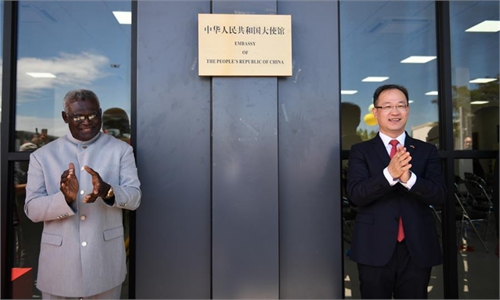West tramples on Solomons’ dignity, sovereignty by intimidating its ties with China

Asia-Pacific Illustration: Chen Xia/GT
Since the establishment of diplomatic relations between China and the Solomon Islands, particularly after Beijing confirmed the signing of a security pact with Honiara, the Pacific Island country has been subject to "a barrage of unwarranted and misplaced criticisms, misinformation and intimidation," as sharply pointed out by Prime Minister of the Solomon Islands Manasseh Damukana Sogavare in an address to the UN General Assembly (UNGA) on Friday.The list goes on and on. For example, when a US delegation led by National Security Council Indo-Pacific Coordinator Kurt Campbell visited the country in April, he warned that Washington would "respond accordingly" to any steps to establish a permanent Chinese military presence in the Solomon Islands.
Above all, it's important to note that those criticisms are aimed at undermining cooperation that is set up between China and regional countries on the basis of sovereign equality, demonstrating that Washington has never regarded Pacific Island Countries (PICs) as sovereign states, nor has it ever viewed China's efforts in the Pacific region within the framework of normal international rules, but rather from a geostrategic perspective, considering itself as the exclusive dominant player in this region. What the US and its allies are afraid of is that cooperation between China and the Solomon Islands becomes a model and leads to a so-called domino effect in the Pacific, and furthermore, in the developing world.
Despite being a small country, the Solomon Islands enjoys the same rights as the US does to choose with whom to develop relationship. So when the US, Australia and other Western countries denigrate China's bilateral cooperation with the Solomon Islands, they are not only undermining China's interests, but also trampling on the dignity and national sovereignty of the island country and posing a strategic threat, the essence of which was illustrated in Sogavare's UNGA address.
This is why Washington insists on strengthening the "Partners in the Blue Pacific" (PBP) aimed at "coordinating assistance to the strategically vital region" despite the existing Pacific Islands Forum (PIF), in which almost all present and potential member states of PBP are included, either as member nations or dialogue partners. However, it's well known that the US is accustomed to competing for dominance when engaging in multilateral cooperation. With the relative difficulty of taking control within the PIF framework, Washington prefers to take the lead itself in establishing a new mechanism which it can dominate, namely the PBP, which is about to be expanded to include Canada and Germany.
If the US is serious about the PICs, it should not have ignored the Rarotonga Treaty, being the South Pacific Nuclear-Free Zone (SPNFZ) Treaty, highlighted by Sogavare in his speech at the UNGA, instead of having pushed for new AUKUS activities. According to the Wall Street Journal citing Western officials on Friday, the Joe Biden administration is in discussion with Australia to build the first few nuclear-powered submarines for the latter in the US. The US and the UK, as two main nuclear powers, are ripping apart the global nuclear non-proliferation regime and posing the most direct threat to the SPNFZ by introducing a nuclear-power weapons deal with a non-nuclear country.
Regardless of the emphasis on "conventional weapons" carried by the nuclear-powered submarines, their presence in Australia would mean that the country could be driven to build matching infrastructure and a port, which would serve as a base for US and UK nuclear submarines in the South Pacific, meeting Washington's desire to hold the strategic pivot connecting the Pacific Ocean and the Indian Ocean. The US is simply using Australia's "nuclearization" to remove political barriers to the entry of US nuclear submarines into the South Pacific. It would be a trigger for the collapse of the SPNFZ.
On the sidelines of this UNGA, Chinese State Councilor and Foreign Minister Wang Yi met with Foreign Minister of Solomon Islands Jeremiah Manele. Wang stressed that among the six cooperation platforms tailored for PICs, regarding climate change, poverty reduction, agriculture, disaster preparedness and mitigation, some have been completed while others will be phased in over time.
China's overseas cooperation projects have two most distinctive features. One is that no political conditions are attached, and countries are equal in sovereignty regardless of their size, in contrast to the West's economic investment in the Global South. Second, China's foreign cooperation focuses first and foremost on raising the living standards and sustainable development demands for target countries. All of China's overseas cooperation is fundamentally aimed at creating an international environment of peace and development.
When it comes to the upcoming US-Pacific Island Country Summit to be held in Washington on September 28-29, objectively speaking, the summit as well as some of the follow-up measures will play a role to some extent, considering that the development of the PICs requires broader global engagement. Nevertheless, given what the West has done throughout history to the developing world, it's highly doubtful whether such cooperation can politically guarantee the sovereign equality of regional countries, and in practice prioritize their actual needs.
Past experience has taught us that small developing countries often have to cede sovereignty in order to obtain resources from the West, which is a challenge even in 2022. If this US-Pacific Island Country Summit introduces more projects based on the Washington's geopolitical interests, those plans will also repeat the mistakes of the US' investment with many other developing countries that failed to achieve their intended purpose, or even completely failed.
The author is a senior research fellow at the China Institute of International Studies. opinion@globaltimes.com.cn



